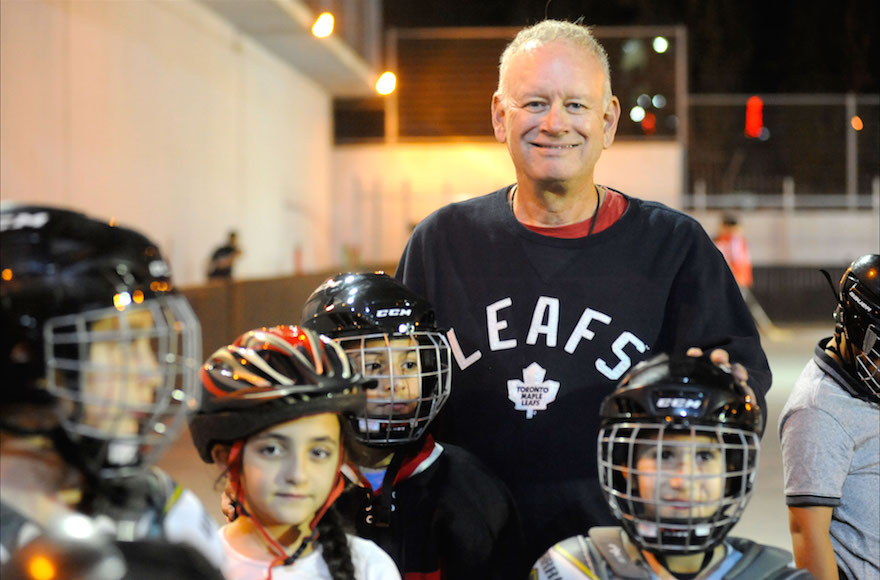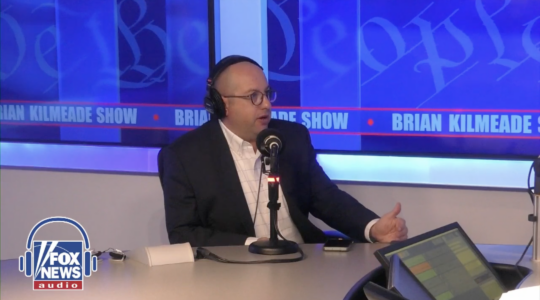This story is sponsored by Nefesh B’Nefesh.
NAZARETH, Israel — On a recent Friday evening, as prayers from nearby mosques blared over loudspeakers and the sun dipped below a horizon dotted with ancient churches, the lights flickered on at a municipal hockey rink in a working-class neighborhood of this city.
Within minutes, 50 boys and girls on Rollerblades and in colorful uniforms — nearly all of them Arabs — descended on the rink to spend the next two hours practicing a sport more associated with frigid Montreal or Moscow than the arid Middle East.
These are the Nazareth Tigers — the only Arab ice hockey franchise in Israel. Hockey was brought to the country in the 1980s by Russian and Canadian Jewish immigrants, and today there are about 15 professional and amateur hockey teams organized under the Ice Hockey Federation of Israel.
“In a million years, I never thought I’d be doing hockey here,” said one of the Tigers’ lead coaches, Marc Milzman, 59, who sold all his hockey equipment before immigrating to Karmiel three years ago from Roanoke, Virginia. “But I love these kids. They love the sport. They get it, they understand it and they love the fact that they’re moving fast on Rollerblades.”
Twice a week, Milzman drives to Nazareth, Israel’s largest predominantly Arab city with about 90,000 residents, so he can coach his budding hockey players. He also coaches them once a month in Metula, Israel’s northernmost town on the Lebanese border, where the kids can play on ice instead of using in-line skates to simulate the game.
Milzman’s hockey coaching partner is Ramez Lahham, 42, a software engineer and Nazareth native whose son, Neal, got him into the game. Lahham educated himself about coaching hockey by watching YouTube training videos and making friends at the Canadian-Israeli Hockey School in Metula. Now he has Level 4 coaching certification from the USA Hockey association.
Over the course of five years, the Nazareth Tigers have grown from 15 children to about 55, including 16 girls, ranging in age from 7 to 16. The program costs about $30 per month and involves two to four hours per week of training.
“We accept all kinds of kids — Christian, Muslim and Jewish. We’re all part of the hockey family,” Lahham said. “We get connected through sports. We play together; this is our motto. Here it’s not about politics, it’s about people trying to find a way to live together.”

Young Arab hockey players practicing on Rollerblades on a Friday evening in Nazareth. (Larry Luxner)
Milzman shares that philosophy. It’s one reason he was drawn to the Nazareth Tigers in the first place.
“The kids respect each other. When our team plays in Metula, we get nothing but love from the other teams,” he said between practice sets. “We never discuss politics. I don’t even know what their politics are.”
Milzman, a die-hard fan of the Toronto Maple Leafs, was born in Washington, D.C., and raised in suburban Maryland. He also lived in New York, Los Angeles and Virginia, but acquired his love for hockey during 14 years living on and off in Vancouver, Canada.
A former health care executive, Milzman was inspired to make aliyah, or immigrate to Israel, by his great-grandfather, who was sent by Baron Edmond de Rothschild to teach Hebrew to immigrants in the Galilee town of Zichron Yaakov.
“My grandmother and an uncle were born there, so I always felt a connection,” Milzman said.
He and his wife, Carolyn, made two pilot trips to Israel and then moved for good on July 7, 2014 — the first day of Operation Protective Edge, Israel’s war in Gaza. They settled in the Galilee town of Karmiel as part of the “Go North” program run by Nefesh B’Nefesh and Keren Kayemeth LeIsrael.
“Nefesh B’Nefesh provided a first-rate website, webinars, checklists, aliyah fairs and great post-aliyah support,” he said. “They also hooked us up with local volunteers who helped make this huge move much easier and less stressful than it might have been.”
In addition to coaching the Tigers, Milzman teaches hockey to children in the Arab Galilee village of Ras al-Ein and works 20 hours a week for SportSkills coaching baseball at schools and community centers throughout the Galilee.
Majd Zaher, the Tigers’ goalie, has been playing hockey for six years. A husky 14-year-old who plans to study physics and chemistry in college, he said his mother saw a Facebook post about the squad and encouraged him to sign up.
“I came and watched the training, and I liked it,” he said. “It’s a fun game, and it has sportsmanship. We don’t have a lot of this in Israel.”
Hockey also allows the Tigers to travel. Besides playing other Israeli teams in Nes Ziona, Rishon LeZion and Metula, a few lucky teammates recently went on an extended tour to Vancouver, Calgary and Winnipeg in Canada, as well as Pittsburgh and Washington, D.C.
“We are very specific in choosing kids with potential,” Lahham said. “If you want to be on the team, you need a lot of discipline. You should obey your coaches. We try to open their minds and let them see new places, new things, new adventures in life.”
Nazareth’s municipal government spends about $5,700 annually to maintain the hockey program. Substantial help also comes from Toronto philanthropist Sidney Greenberg, who bankrolls ice time at Metula’s Canada Center, and from Ahmad Afifi, a Nazareth bus company owner who transports the team to Metula for free once a month. The Nazareth rink was financed by Detroit philanthropists Irwin and Bethea Green.

Neil Lahham and Majd Zahar, both 14, take a break from hockey practice in Nazareth. (Larry Luxner)
Hockey is an expensive sport, especially in Israel. Basic gear — including helmet, hockey stick, gloves, in-line skates, and knee, chin and elbow pads — easily can run about $850, according to Raji Srouji, director of sports for the City of Nazareth. But Srouji, a former professional basketball player and coach, says hockey is a wise long-term investment for his city.
“Nobody says ‘no’ to this kind of project,” Srouji said. “Even though I have Palestinian roots and will always be like that, my sons and grandsons are citizens of Israel. I believe in living together. This is not even about coexistence. We need each other.”
Just ask Denis Superfin, the 15-year-old son of Russian immigrants who lives in nearby Nazareth Illit, which is 80 percent Jewish.
“I left my last team because there was no one my age,” he said. “I was 12 and they were little kids, so I played with adults. I can’t live without hockey, so I came here.”
Denis doesn’t understand Arabic, but that’s OK because Milzman coaches him in English and Lahham in Hebrew.
Asked if he cares that he’s the only Jew on the team, Denis says, “No, it’s not important. We just play.”
(This article was sponsored by and produced in partnership with Nefesh B’Nefesh, which in cooperation with Israel’s Ministry of Aliyah, The Jewish Agency, KKL and JNF-USA is minimizing the professional, logistical and social obstacles of aliyah, and has brought over 50,000 olim from North America and the United Kingdom in the past 15 years. This article was produced by JTA’s native content team.)
JTA has documented Jewish history in real-time for over a century. Keep our journalism strong by joining us in supporting independent, award-winning reporting.






